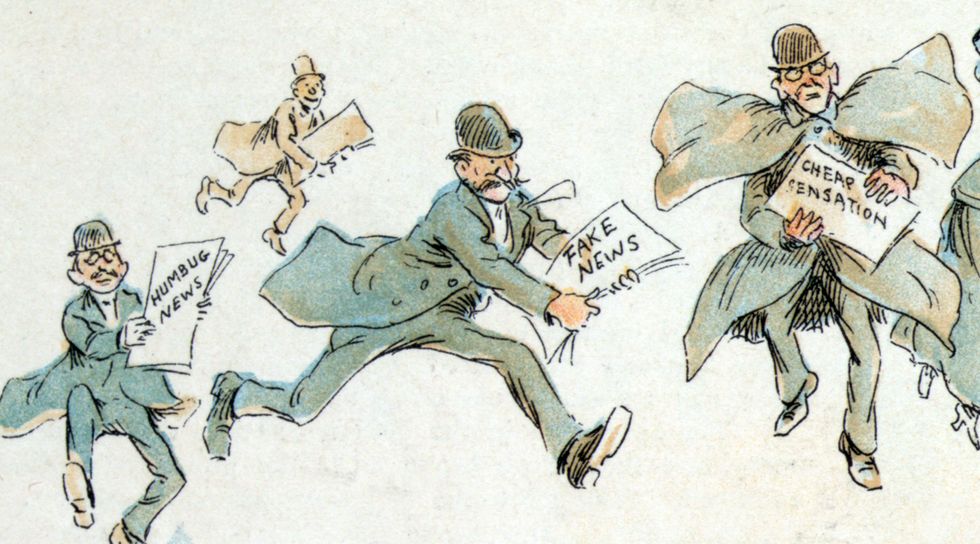Almost one year ago, Donald Trump was inaugurated as our nation’s President. There was a lot of backlash from coast to coast, and it really hasn’t stopped since. As Trump was sworn in despite not having the majority of the popular vote, the Internet boomed with "#NotMyPresident" and a Science March as well as a Women’s March, among others. 2017 Green Party Candidate Jill Stein even went so far as to call for a recount in three key states. As 2017 ended, though, it was a very intense and rough year for U.S. politics, especially among media sources.
A phrase, a very ugly one at that, has entered our mainstream media and I don’t know about you, but I hear it every day. Walking by peers talking, hearing something hard to believe, scrolling through Twitter, or even in a joking sense, “Fake News” is something just about everyone has said or heard over and over. I think about this a lot, because until his Presidency began, I had heard of the media being distorted and biased, but no one (to my knowledge, at least) came out to call anything “fake news.” It seems like we can’t even escape the hype of the phrase for a few hours.
Recommended for you
So, with this wonderful jargon floating around, coming out in tweets from the President, I began to wonder, “Why now? The media has been misleading to paint a narrative or a story for as long as my memory serves. What makes it so much more scrutinized than before? Sure, yellow journalism has existed for forever, and there's always been some level of scrutiny, but why has there been such an explosion of interest in what the media claims is true or false?"
For one, President Trump publishes it regularly to followers who are political scientists, politicians, comedians, and others of various careers does not make it easy to ignore. The chief-in-command, the person who is supposed to represent and unify our nation and who is supposed to have the country’s best interest in their heart, is constantly talking about the horrible media; of course it’ll stick in people’s heads. He also has decided to personally release awards to media outlets which he thinks are the most problematic. Heinous and ridiculous if you ask me, but that’s a whole other topic to discuss.
Secondly, by echoing this phrase into millions of ears every day, it’s hard not to think about what you are digesting as a podcast listener and a journal reader. Questioning the media is something that should always be in the back of your brain, because it also demonstrates critical thinking skills which are helpful for everyday life and decreases naivety. So sure, bringing upon the idea of fake news to people who may not have considered that before can be seen as a good thing.
In order to reach their audiences, plenty of comedians will continue to tear apart President Trump in bits and skits. If Trump was attempting to just point out dishonesty in media, it would be one thing, and wouldn’t be found as foolish; however, he seems to participate in it as well and does not alleviate the problem. Not only does he provide zero solutions to fix the “fake news and dishonest media,” he also clearly biases towards other providers and what exactly is the “truth.”
Now, why would truth be in quotation marks? The truth is full of facts, right? Sure, I suppose so. But the “truth” I'm talking about here is unbalanced, biased facts that may have different agendas or points behind them to fuel an argument. Historians will be examining tweets heavily in the future, especially of those in this presidency, as Trump uses his personal account to make very formal announcements and to take shots at some other politicians. There’s already an entire archive online dedicated to permanently storing his tweets for people to scrutinize and for some to get a good laugh out of.
Some tweets sure are funny and some flat out don’t make sense. However, after a while, it stops becoming funny when the realization sets in that this person in charge of the Executive Branch releases to the public who he feels is a “loser” and gives nasty nicknames to any opposition. It is normal to not want someone from an opposing party to fill a seat in the House of Representatives or in the Senate, but it is not usually expressed by vague responses or in labeling people as crazy or crooked. I’m no Clinton fan either, but really?
Fake news has really flourished in the Trump Administration and it seems to be here to stay, whether anyone likes it or not. But posting things that are flat out false as well or purposefully excluding your favorite news media source in any measure of who is truly dishonest is not going to make the “fake news” go away. In fact, it may even encourage some sources to contribute to it. There are people who say that since Trump won the Presidency, anyone has a chance to win it; what if people have that same mentality about posting stories or releasing information to the public, no matter how true or false it is?
If this “fake news” mantra is to lessen, it may fall upon the shoulders of the citizens of the country to not follow in Trump’s steps, but to take a different approach to solving the same problem. If it becomes apparent a news source is publishing biased or false information, do not use it and do not pay exclusive attention to it. Or, to understand the honest event at hand, read posts and articles and listen to podcasts that both lean left and right; whatever the two have in common is probably the truth of the matter.


















